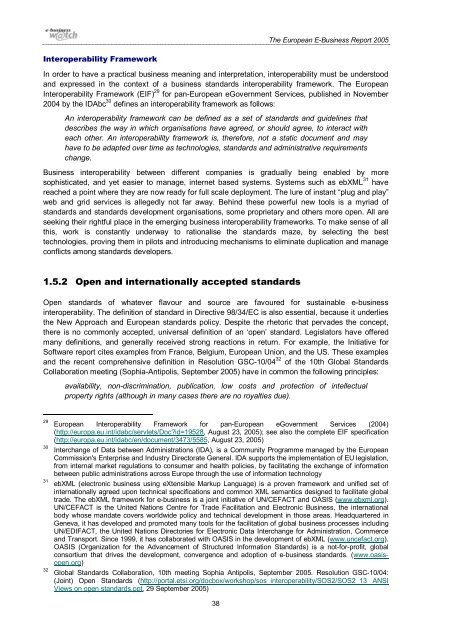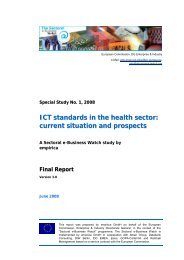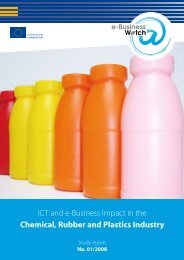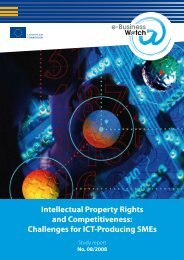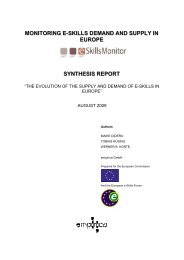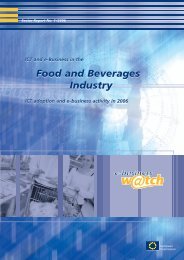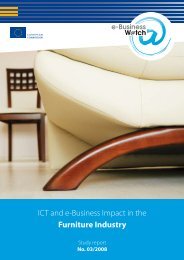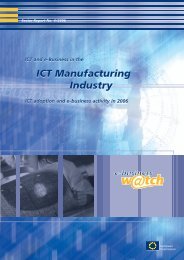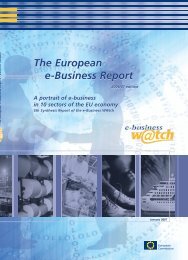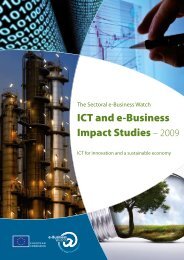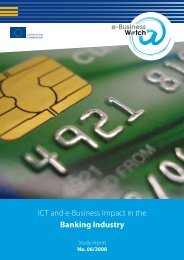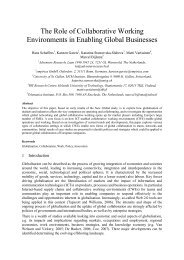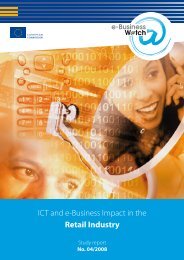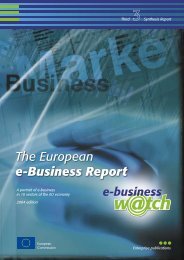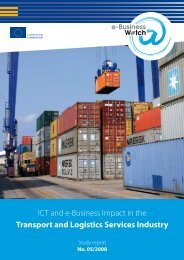The European e-Business Report The European e ... - empirica
The European e-Business Report The European e ... - empirica
The European e-Business Report The European e ... - empirica
Create successful ePaper yourself
Turn your PDF publications into a flip-book with our unique Google optimized e-Paper software.
<strong>The</strong> <strong>European</strong> E-<strong>Business</strong> <strong>Report</strong> 2005<br />
Interoperability Framework<br />
In order to have a practical business meaning and interpretation, interoperability must be understood<br />
and expressed in the context of a business standards interoperability framework. <strong>The</strong> <strong>European</strong><br />
Interoperability Framework (EIF) 29 for pan-<strong>European</strong> eGovernment Services, published in November<br />
2004 by the IDAbc 30 defines an interoperability framework as follows:<br />
An interoperability framework can be defined as a set of standards and guidelines that<br />
describes the way in which organisations have agreed, or should agree, to interact with<br />
each other. An interoperability framework is, therefore, not a static document and may<br />
have to be adapted over time as technologies, standards and administrative requirements<br />
change.<br />
<strong>Business</strong> interoperability between different companies is gradually being enabled by more<br />
sophisticated, and yet easier to manage, internet based systems. Systems such as ebXML 31 have<br />
reached a point where they are now ready for full scale deployment. <strong>The</strong> lure of instant “plug and play”<br />
web and grid services is allegedly not far away. Behind these powerful new tools is a myriad of<br />
standards and standards development organisations, some proprietary and others more open. All are<br />
seeking their rightful place in the emerging business interoperability frameworks. To make sense of all<br />
this, work is constantly underway to rationalise the standards maze, by selecting the best<br />
technologies, proving them in pilots and introducing mechanisms to eliminate duplication and manage<br />
conflicts among standards developers.<br />
1.5.2 Open and internationally accepted standards<br />
Open standards of whatever flavour and source are favoured for sustainable e-business<br />
interoperability. <strong>The</strong> definition of standard in Directive 98/34/EC is also essential, because it underlies<br />
the New Approach and <strong>European</strong> standards policy. Despite the rhetoric that pervades the concept,<br />
there is no commonly accepted, universal definition of an ‘open’ standard. Legislators have offered<br />
many definitions, and generally received strong reactions in return. For example, the Initiative for<br />
Software report cites examples from France, Belgium, <strong>European</strong> Union, and the US. <strong>The</strong>se examples<br />
and the recent comprehensive definition in Resolution GSC-10/04 32 of the 10th Global Standards<br />
Collaboration meeting (Sophia-Antipolis, September 2005) have in common the following principles:<br />
availability, non-discrimination, publication, low costs and protection of intellectual<br />
property rights (although in many cases there are no royalties due).<br />
29<br />
30<br />
31<br />
32<br />
<strong>European</strong> Interoperability Framework for pan-<strong>European</strong> eGovernment Services (2004)<br />
(http://europa.eu.int/idabc/servlets/Doc?id=19528, August 23, 2005); see also the complete EIF specification<br />
(http://europa.eu.int/idabc/en/document/3473/5585, August 23, 2005)<br />
Interchange of Data between Administrations (IDA), is a Community Programme managed by the <strong>European</strong><br />
Commission's Enterprise and Industry Directorate General. IDA supports the implementation of EU legislation,<br />
from internal market regulations to consumer and health policies, by facilitating the exchange of information<br />
between public administrations across Europe through the use of information technology<br />
ebXML (electronic business using eXtensible Markup Language) is a proven framework and unified set of<br />
internationally agreed upon technical specifications and common XML semantics designed to facilitate global<br />
trade. <strong>The</strong> ebXML framework for e-business is a joint initiative of UN/CEFACT and OASIS (www.ebxml.org).<br />
UN/CEFACT is the United Nations Centre for Trade Facilitation and Electronic <strong>Business</strong>, the international<br />
body whose mandate covers worldwide policy and technical development in those areas. Headquartered in<br />
Geneva, it has developed and promoted many tools for the facilitation of global business processes including<br />
UN/EDIFACT, the United Nations Directories for Electronic Data Interchange for Administration, Commerce<br />
and Transport. Since 1999, it has collaborated with OASIS in the development of ebXML (www.uncefact.org).<br />
OASIS (Organization for the Advancement of Structured Information Standards) is a not-for-profit, global<br />
consortium that drives the development, convergence and adoption of e-business standards. (www.oasisopen.org)<br />
Global Standards Collaboration, 10th meeting Sophia Antipolis, September 2005. Resolution GSC-10/04:<br />
(Joint) Open Standards (http://portal.etsi.org/docbox/workshop/sos_interoperability/SOS2/SOS2_13 ANSI<br />
Views on open standards.ppt, 29 September 2005)<br />
38


